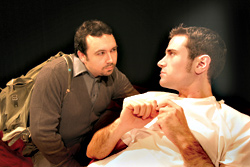Michael Lewis MacLennan’s play Beat the Sunset—receiving its U.S. premiere after several Canadian productions starting in 1993—begins with an odd, ethereal disquisition on that most abstracted of organs, delivered with bardic intensity by a woman we know only as Memory (Jeanette LeGault). “It’s the first part to live, the last to die.” Speak, Memory—of the heart. The apparent recipient of this monologue, at that moment lying unconscious on a hospital bed, is Adam (Ricky Coates), a man whose full-blown AIDS has reduced him kicking and screaming to a mere body; his anger and disgust have a physical charge that electrifies everything in its midst. Adam soon receives a surprise visitor, Sacha (Gavin Cummins), a long-absent childhood friend. The instant and bitchy animosity that erupts between the two, mostly from Adam, bespeaks strangled intimacies and shallowly buried secrets. The air crackles.
Directed by ArtsWest’s Christopher Zinovitch, Beat the Sunset delves deeply into the idea of illness as metaphor, though the narrative quickly upends easy assumptions about the nature and meaning of disease. AIDS is contextualized in a broader historical examination of epidemiology, and in so doing MacLennan presents a very particular, individualistic perspective on sickness and mortality. When you fear illness, he seems to say, you are simply fearing death, which, after all, is always with us. Disease becomes an emotional and spiritual obstacle not only for Adam but for Sacha, too: a means of channeling deeper fears of intimacy into a palpable revulsion. For these characters, there is nothing to fear but fear itself.
Such an idea-rich, American Zen play, driven as much by concepts as character, is susceptible to all manner of interpretations. Zinovitch, who recently scored such a success with As Bees in Honey Drown, chooses to crank up the emotional volume, turning Sunset into a bedside melodrama. Instinctually, this might seem the right move, but the overheated confessional scenes end up scuttling the play’s more cerebral elements, creating a kind of dramatic atonality. The small cast—rounded out by Dawn Brazel as Iris, Adam’s mother—gives it their all, but the actors seem largely uncertain about what note to strike in this intriguing but uneven production.








